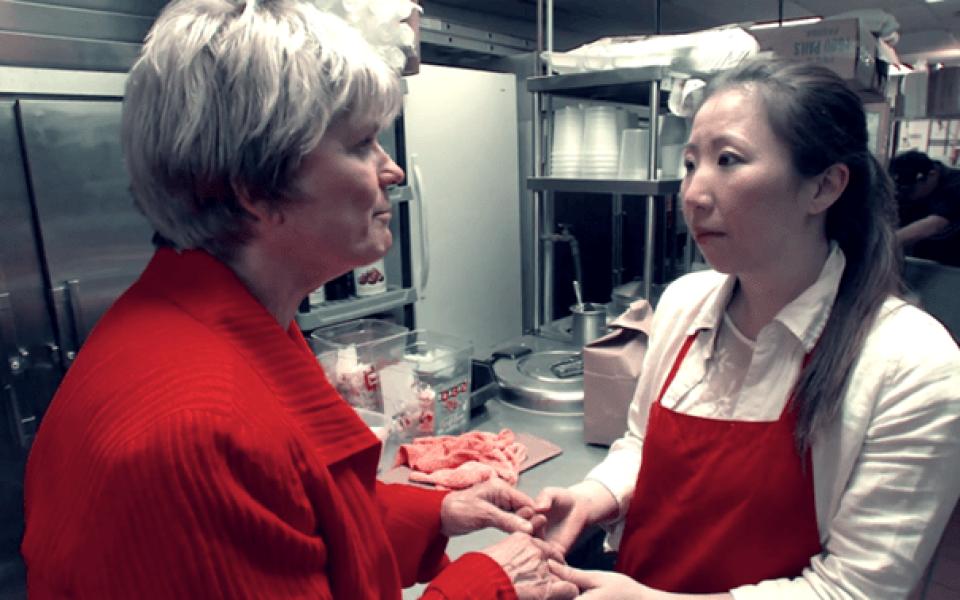Dir. Mohamad HouHou, France, 2018, 77 min.
This rollercoaster of a documentary delves into a under-examined facet of the abortion debate by highlighting the story of Bei Bei Shuai, a 35-year-old Chinese immigrant who became the first woman in Indiana history to be charged with the murder of her unborn child because of an attempted suicide in 2011. Bei Bei follows Shuai — whose case becomes a focal point in the abortion debate in Indiana, a state that has historically been conservative when it comes to a woman’s right to choose — and depicts the complicated ways in which abortion rights, mental health and immigration can intersect when the justice system gets involved.
After having her heart broken by the father of her child, Shuai takes rat poison as a way to escape her sorrow. When she’s taken to the hospital, the employees tell her that she has to make a decision of whether or not to take her child, who was born by emergency C-section, off of life support. After Shuai makes the difficult decision to do so, she gets hit with two felony charges — one for murder and one for infanticide — and spends 435 days in jail and before being released on bail.
Interviews with a wide cast of characters — including Shuai’s defense attorney, Linda Pence, and Terry Curry, the chief prosecutor of the case — unveil the complex parts of a case that made headlines for its uniqueness.
“Most people don’t understand how vulnerable they are in our society,” Pence says. “They don’t understand how easily they can be free one day and then be accused of something the next and all their rights are stripped and they’re in jail.”
In addition to closely following Shuai’s emotional journey throughout the case’s two-year lifespan, the documentary looks at the history and legislative precedents that enabled the prosecution to file charges against Shuai, who had never had a criminal record. Shots of former President George W. Bush signing the Fetus Protection Bill, as well as interviews with two Indiana Republican senators who introduced a bill to enhance the penalty for fetal homicide in the state, are shown in the film.
“How in the world could you take a grieving woman that has just suffered all of that pain and a loss that she’ll be living with for the rest of her life and pull her into the criminal justice system?” Pence asks.
As someone who came the United States alone, the documentary shows the growing bonds that Shuai forms with those who support her through the emotional process.
“You’re like my mother,” Shuai says to Pence at one point in the documentary.
As the film progresses, more and more pieces of the case come out of the woodwork, like unreliable testimony by a pathologist with religious ties and Curry’s attempts to run for re-election amidst the whirlwind of the highly publicized case.
By the end of Bei Bei, Shuai’s future looks brighter, but the film reminds viewers that cases like Shuai’s are on the rise and as hers comes to an end, another Indiana woman’s case is just beginning, under similar circumstances.
“This is really important to me,” Shuai says. “To fight this case. Not only for me, but I think it’s for other woman too. You’re pregnant; you’ve been through a lot of stuff. Your hormones change. Your life is changed. And then, anything could happen. And when something happens, what you really need is a lot of different supports. Not the jail time.”
Bei Bei screens April 12 at 10:30 a.m. and April 13 at 3 p.m. at A/perture 2 in Winston-Salem.
— SM
You may also enjoy these Riverrun 2019 reviews:
‘Santuario’: This locally tied documentary brings the immigration debate home as it follows Juana Luz Tobar Ortega, a Guatemalan woman who sought sanctuary in an unfamiliar Greensboro church in 2017 to avoid deportation.
The River and the Wall: This visually stunning documentary tracks a group of friends who travel from El Paso to the Gulf of Mexico on a 1,200-mile journey to document the border and investigate the looming impacts of a wall on the natural environment.
Find the full list of reviews here.
Join the First Amendment Society, a membership that goes directly to funding TCB‘s newsroom.
We believe that reporting can save the world.
The TCB First Amendment Society recognizes the vital role of a free, unfettered press with a bundling of local experiences designed to build community, and unique engagements with our newsroom that will help you understand, and shape, local journalism’s critical role in uplifting the people in our cities.
All revenue goes directly into the newsroom as reporters’ salaries and freelance commissions.


Leave a Reply